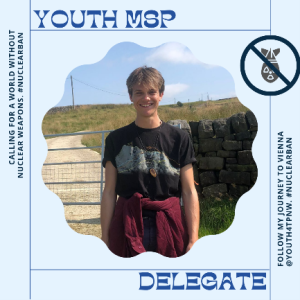By Matty Maslen – Bradford/Glasgow University
On the 22nd January last year, the Treaty on the Prohibition of Nuclear Weapons (TPNW) entered into force. The treaty is a comprehensive prohibition on the development, production, stockpiling and use – or threat of use – of nuclear weapons. In other words, it is a legally binding agreement that bans nuclear weapons.
The TPNW has 86 signatories and has been ratified by 60 states. The United Nations website explains that in cases where States have signed but not ratified the treaty, it “is a means of authentication and expresses the willingness of the signatory state to continue the treaty-making process. The signature qualifies the signatory state to proceed to ratification, acceptance or approval. It also creates an obligation to refrain, in good faith, from acts that would defeat the object and the purpose of the treaty.”. Whereas ratification is a State demonstrating “its consent to be bound to a treaty”. I’m sure that it’s not news to you to hear that the UK has still done neither.
In June this year, the first MSP (Meeting of State Parties) is happening in Vienna. This is an international conference where those who have ratified the treaty will meet to discuss how to keep to the obligations the treaty commits them to.
 I’ve been given a space on the Youth Delegation through the organisation Youth for TPNW. Along with 130 other young people from five continents I will be visiting Vienna to be part of the civil society presence and to ensure that the voice of young people is not drowned out.
I’ve been given a space on the Youth Delegation through the organisation Youth for TPNW. Along with 130 other young people from five continents I will be visiting Vienna to be part of the civil society presence and to ensure that the voice of young people is not drowned out.
We have been lucky enough to receive zoom lectures from experts from around the world. Our pre-MSP events began in March. So far, we have had four fascinating and informative meetings, as well as some networking ones to help us get to know each other.
By the time of the conference in June, we will have had discussions on:
- What disarmament really means
- The importance and impact of advocacy and where we fit into it
- The history of Africa and nuclear weapons
- The impact of nuclear weapons on the Pacific region
- NATO
- Gender and nuclear weapons
- The intersections between nuclear weapons and the climate crisis
- The humanitarian impacts of nuclear weapons.
These discussions begin with presentations from experts in the field and are followed by Q&A sessions. There is also a session planned where we will be given to the chance to talk to UN diplomats.
I feel delighted to have been given the opportunity to attend the conference.
Already the zoom meetings we’ve had have broadened my knowledge on the topic immensely.
In the first meeting we had we were split into break-out rooms on zoom so that we could discuss in smaller groups what exactly we were hoping to gain from the experience and specifically what we hope to have gained between now and the conference.
It was interesting that so many of us mentioned that our understanding of nuclear weapons was limited to our experience of them in our own countries. For myself, my knowledge has always been based around Trident and the history that Britain has with nuclear weapons. So, for a lot of the delegates, myself included, we shared a desire to learn more about the international experience.
As with many other important issues, such as the climate crisis, the conversation around nuclear weapons is dominated by a very small circle of countries. Take, for example, the Iraq War where the US and the UK tried to legitimise their own nuclear weapons while delegitimising the idea of other states developing them. These states who dominate the arena are not the states who pay the highest humanitarian or environmental costs.
In the run-up to the conference our youth delegation is taking an active role in educating ourselves on the impacts of nuclear weapons beyond the limited scope of the Global North. We believe it is important to make sure the voices of those who are disproportionately affected must be put at the forefront of the conversation. As the TPNW itself highlights, nuclear weapons have: “disproportionate impact on women and girls”, and “disproportionate impact of nuclear-weapon activities on indigenous peoples”. It is crucial that this is at the centre of conversations had.
Only one month into the events that Youth for TPNW have arranged I already feel much more prepared for the conference in summer.
The aims of our youth delegation are to:
- Mobilise, educate & engage young people all over the world around nuclear disarmament, teaching valuable skills in policy, campaigning, diplomacy, advocacy, & insight into UN procedures
- Create a strong youth presence at the conference
- Explore the interconnections between nuclear weapons and the climate crisis, racism, inequality, & injustice
I’m excited to continue learning over the coming months and I’m hopeful that the MSP in Vienna will lead to a useful starting point for the return to a world free of nuclear weapons. I believe that young people, and other marginalised groups, have a crucial role to play in this and I’m honoured to be a part of it.
FOR UPDATES ON THE TPNW:
You can find the text of the treaty here:
https://treaties.unoda.org/t/tpnw
Check out the Youth for TPNW website: http://youthfortpnw.net/
Or follow them on Twitter: @Youth4TPNW
Check out the ICAN website: https://www.icanw.org/signature_and_ratification_status
